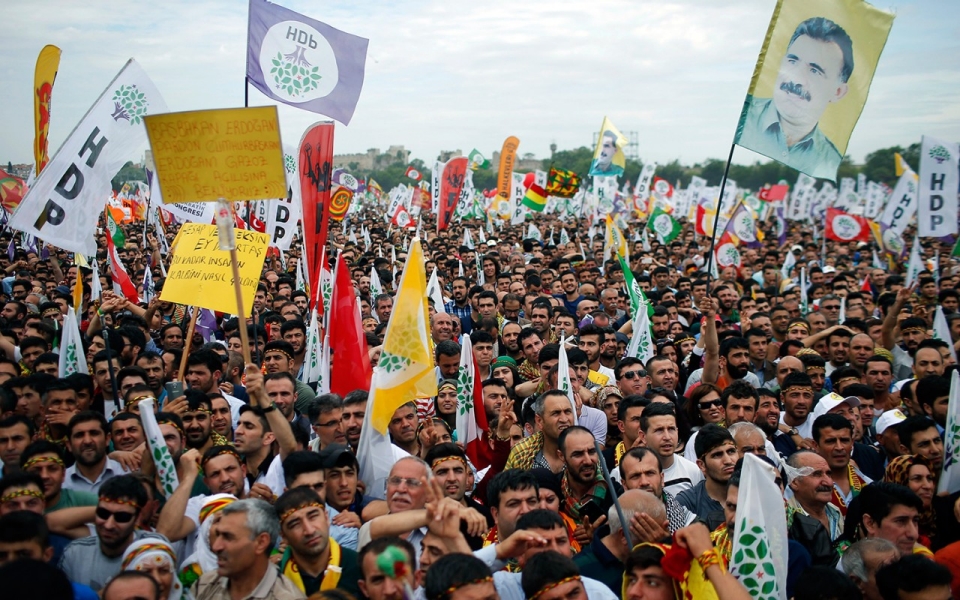
The Turkish Election and Responses in the South Caucasus
Publication: Eurasia Daily Monitor Volume: 12 Issue: 115
By:

The general election in Turkey on June 7 has radically changed the country’s political landscape. The ruling Justice and Development Party (AKP) has lost its absolute majority, winning only 258 of the 276 seats it needed, and the pro-Kurdish Peoples’ Democratic Party (HDP) has now entered the parliament (Today’s Zaman, June 8). With coalition talks set to begin, this new, probably turbulent, political reality will have an impact on Ankara’s foreign policy and bilateral relations, including with the South Caucasus countries.
The Turkish election results have received relatively little coverage in the Georgian press, and nor have there been official statements by Georgia’s government. During its campaign, the HDP made no mention of Georgia in its foreign policy discussions. The only exception was a statement by the HDP co-chairman, Selahattin Demirtas, declaring that the party will be peaceful and engage all ethnic minorities in Turkey, including Georgians (Hdp.org.tr, accessed June 19). Despite Tbilisi’s silence on the election outcome, the Georgian political establishment has a number of reasons to be pleased with the results, which weaken President Recep Tayyip Erdoğan’s power and limit the possibility for constitutional amendments broadening the powers of the executive. First of all, President Erdoğan’s personal closeness with Russian President Putin has been worrisome for Tbilisi. Since Russia’s annexation of Crimea, the Black Sea has increasingly become part of Russia’s zone of influence. Notably, Turkey, despite being a member of the North Atlantic Treaty Organization (NATO), has not sought to counter this. On the contrary, Ankara is engaging with Moscow on new types of energy cooperation (see EDM, February 20).
Secondly, the composition of Turkey’s new parliament could threaten the proposed Turkish Stream natural gas pipeline, planned to run from Russia to Turkey across the Black Sea. While the project does not directly threaten Georgia’s role as a transit country in the rival Southern Gas Corridor, Turkish Stream would improve the standing of Putin’s government in the current economic crisis, following the decline in oil prices and recently renewed Western sanctions (see EDM, January 22).
Unlike Georgia, Armenia and Azerbaijan have been much more engaged with the election results and the possible regional impact. Armenia seems to be satisfied with the election outcome for two primary reasons.
Firstly, three Armenian-origin members of parliament were elected, and Yerevan expects that they will be sensitive toward Armenian concerns, within the bounds of the policies of their respective parties. In addition, Armenia-related issues did come up in the Turkish campaign debates, as observed by Yetvart Danzikyan, the editor of the bilingual Turkish-Armenian newspaper Agos: “more people are talking [about the] Armenia issue, Armenian problems” (Voice of America, May 29). Officials in Yerevan do not anticipate any major breakthrough such as the opening of the Turkish-Armenian border, but they are happy to see Erdoğan’s power weakened. Armenians blame Erdoğan for the collapse of the Turkish-Armenian normalization process, and see him as a confrontational and antagonist figure. Eduard Sharmazanov, the vice speaker of the Armenian parliament, stated that, “Ankara’s policy will undergo considerable changes because Erdoğan will no longer be able to promote his programs unequivocally” (Arminfo.info, June 9).
The other reason Armenia is happy with the result is the newly gained parliamentary voice for the HDP, which has demanded the reopening of the border with Armenia, decoupled from the resolution of the Karabakh conflict, and for the tragic events of 1915 to be recognized as a “genocide.” These statements formed part of the party’s election manifesto (Hurriyet Daily News, April 21) and have been restated since the elections by the party leadership. In this regard, Armenia views the HDP as the only political force capable of bringing any change to Armenian-Turkish relations, even if this change is gradual. One of Yerevan’s concerns is that despite the HDP’s election success, the AKP could form a coalition with the nationalist MHP, both diminishing the chances of reopening the border, as well as placing the HDP in a minority opposition.
Azerbaijan’s reaction to the Turkish election is one of concern due to the HDP’s support for opening the Turkish-Armenian border in the absence of pre-conditions relating to the Karabakh conflict. In particular, Baku is concerned about the victory of the HDP’s candidate in the Igdir province in eastern Turkey, populated by an ethnic-Azerbaijani majority. The HDP candidate ousted a nationalist MHP representative. In eastern Turkey, especially Igdir, Kars and Ardahan—home to many Azerbaijanis—MHP or AKP representatives had publically opposed the reopening of the Turkish-Armenian border under current conditions. On the other hand, the AKP has only been weakened, not defeated, and any proposal to reopen the border will require a parliamentary majority, which seems extremely unlikely. Baku is fairly confident of Erdoğan’s support on this issue, and directly congratulated him on the election result.
In summary, the composition of any potential parliamentary coalition will be the key factor in anticipating and interpreting any possible changes to Turkey’s attitude to a number of issues in the South Caucasus. Nonetheless, the weakness of the AKP in the wake of the election has not opened the way for substantial changes to Turkey’s foreign policy trajectory. Despite Armenia’s hopes inspired by the HDP’s campaign rhetoric, the party’s legislative priorities will undoubtedly revolve around Kurdish issues; the reopening of Turkish-Armenian border is by no means at top of the HDP’s agenda. In the case of Georgia and Azerbaijan, a weakened Erdoğan is a potential challenge to the Turkish Stream project—which both Baku and Tbilisi oppose. However, for Azerbaijan, the priority is the Armenian issue; and so from that perspective, Baku supports a strong Erdoğan.




